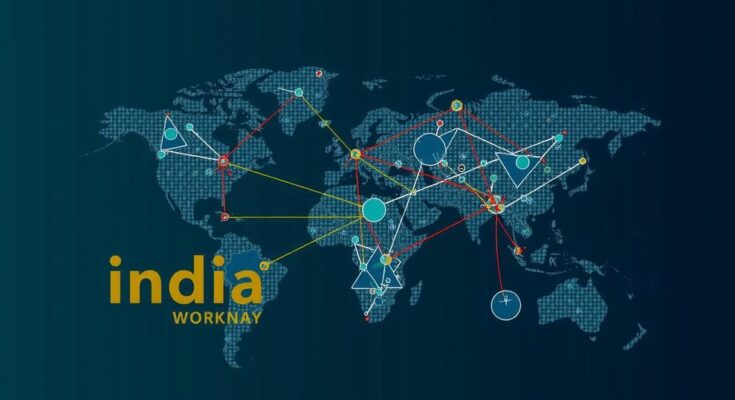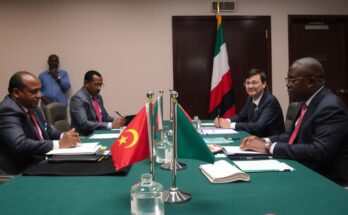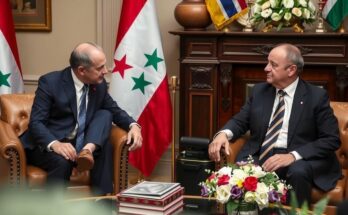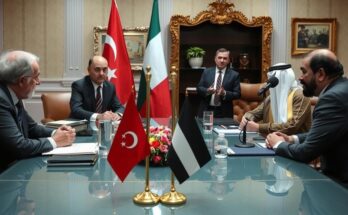Prime Minister Modi’s foreign policy emphasizes a human-centric approach to enhance India’s global standing. By fostering regional relationships, advocating for peace, and participating actively in crises, India transforms from an observer to an influential player. Despite challenges with China and Pakistan, Modi’s strategic pragmatism navigates complex geopolitical landscapes, aiming for regional development and sustainable progress.
Prime Minister Narendra Modi’s approach to foreign policy has significantly reshaped India’s position on the global stage, emphasizing a human-centric framework that harmonizes regional relationships with global dynamics. Reflective of the Indian ethos, Modi’s tenure has catalyzed India’s evolution from a passive observer to an assertive player in international affairs, underscored by India’s proactive roles in crises, its economic growth, and its strategic initiatives. Under Modi’s leadership, India has addressed vulnerabilities stemming from its non-permanent status in the United Nations Security Council (UNSC) through an active pursuit of global influence. This transformation is characterized by India’s role in disaster response, financial aid, and pandemic management, positioning it as a key contributor in times of global need. Modi’s vision galvanizes India to be a voice for consensus within multifaceted geopolitical contexts, navigating the complexities of relations with major powers, including its nuanced ties with Israel alongside advocacy for peace in conflict areas. India’s proactive diplomatic efforts are evident in its emphasis on consensus-building amid global uncertainty. For instance, during the G20 presidency, India promoted dialogue as a means of conflict resolution, a stance illustrated by its position on the Ukraine war. Modi’s government also continues to manage persistent challenges from China and Pakistan with an assertive military stance combined with diplomatic engagement, exemplified by the recent Modi-Xi meeting, which aimed to address border tensions while fostering broader bilateral ties. The Neighbourhood First policy underscores India’s commitment to regional development and continuous engagement with neighboring countries. Modi has prioritized restoring relations, particularly with nations like the Maldives and Bangladesh. In doing so, effective governance of India’s expansive aid programs will be crucial for fostering deeper regional stability and unity. Moreover, India’s role as a leader in global green transitions and clean energy is indicative of its development aspirations. By fulfilling its Paris Agreement commitments early, India has demonstrated its dedication to sustainable progress. However, India faces the significant challenge of participating actively in global trade amidst evolving economic landscapes, especially given the global shift away from dependence on China. As geopolitical narratives evolve, India’s diaspora plays a pivotal role in bolstering Modi’s vision for a developed India while safeguarding against external threats posed by antagonistic forces. Modi’s strategic pragmatism complements his determination to uphold India’s sovereignty against foreign interference, which will be vital for maintaining India’s developmental trajectory.
The article discusses the evolution of India’s foreign policy under Prime Minister Narendra Modi, highlighting a human-centric approach to global challenges. Modi has customized India’s diplomatic stance to bolster its role as a proactive global player, advocating for consensus-building across geopolitical divides and engaging with both allies and adversaries. The discourse reflects India’s response to emerging regional dynamics, including ongoing complexities with Pakistan and China, and outlines both achievements and challenges as India seeks to assert itself in a rapidly changing global landscape.
In conclusion, Prime Minister Modi’s foreign policy marks a pivotal shift in India’s global engagement strategy. By adopting a human-centric approach that fosters consensus and promotes regional stability, India is transforming its role on the world stage. Despite formidable challenges such as persistent geopolitical tensions and economic shifts, Modi’s administration is leveraging India’s strengths to advocate for sustainable development and inclusive international cooperation, underscoring India’s aspirations to emerge as a major global power.
Original Source: www.hindustantimes.com




